Journalists Accuse Cuba’s Rulers of Scapegoating
Photos of Journal-isms Roundtable by Jeanine L. Cummins
Donations are tax-deductible. On Facebook, please support Journal-isms Inc. for Giving Tuesday on its last day, Dec. 6, or on Go Fund Me at Fundraiser by Richard Prince : Richard Prince’s Journal-isms (gofundme.com)
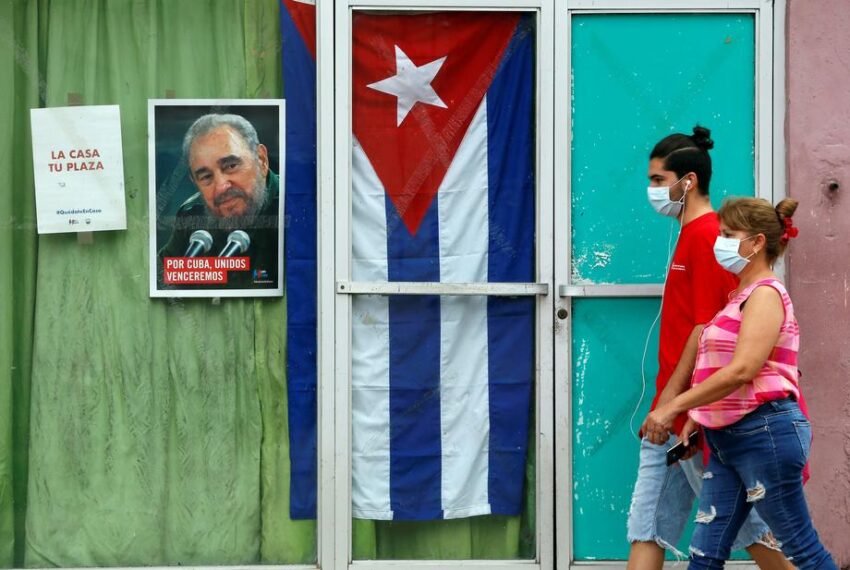
Journalists Accuse Cuba’s Rulers of Scapegoating
The 60-year U.S. embargo against Cuba, a rallying point for activists who argue that the communist country is being unfairly stigmatized by the Yankees, is being used as a scapegoat by a repressive regime that persecutes independent journalists and seeks to deflect attention from its own mismanagement and incompetence, according to three independent Cuban journalists and a Cuban communications professional.
It was as if, the journalists seemed to be saying, the Cuban government is defending itself by protesting, “the embargo made me do it.”
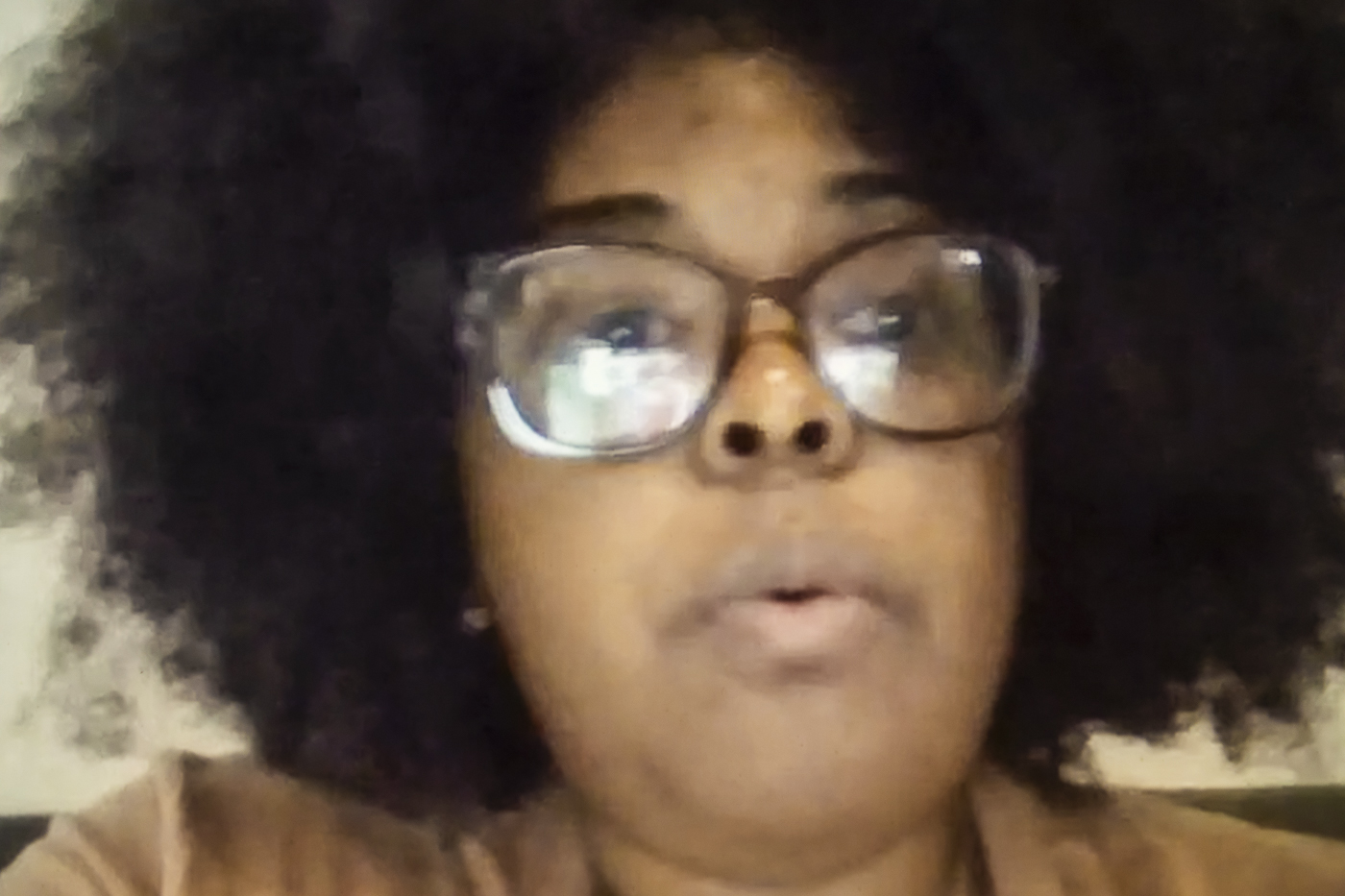 “I would love the embargo to go away just for people to really see what the problem is, and it’s not the embargo,” Rocio Baro (pictured) told the Journal-isms Roundtable. She is a communications professional who is in the United States as participant in the Hubert H. Humphrey Fellowship Program at Arizona State University’s Walter Cronkite School of Journalism and Mass Communication.
“I would love the embargo to go away just for people to really see what the problem is, and it’s not the embargo,” Rocio Baro (pictured) told the Journal-isms Roundtable. She is a communications professional who is in the United States as participant in the Hubert H. Humphrey Fellowship Program at Arizona State University’s Walter Cronkite School of Journalism and Mass Communication.
Added Darcy Borrero Batista (pictured, below), a Cuban journalist and human rights defender now in the U.S., “I want to elaborate into the narrative of this 60 years that the Cuban government has been playing the victim, it has been something very, very easy trying to, to do that and playing the David versus Goliath situation.” Borrero was part of an award-winning cross-border investigation in 19 countries, “Violence During Quarantine.”
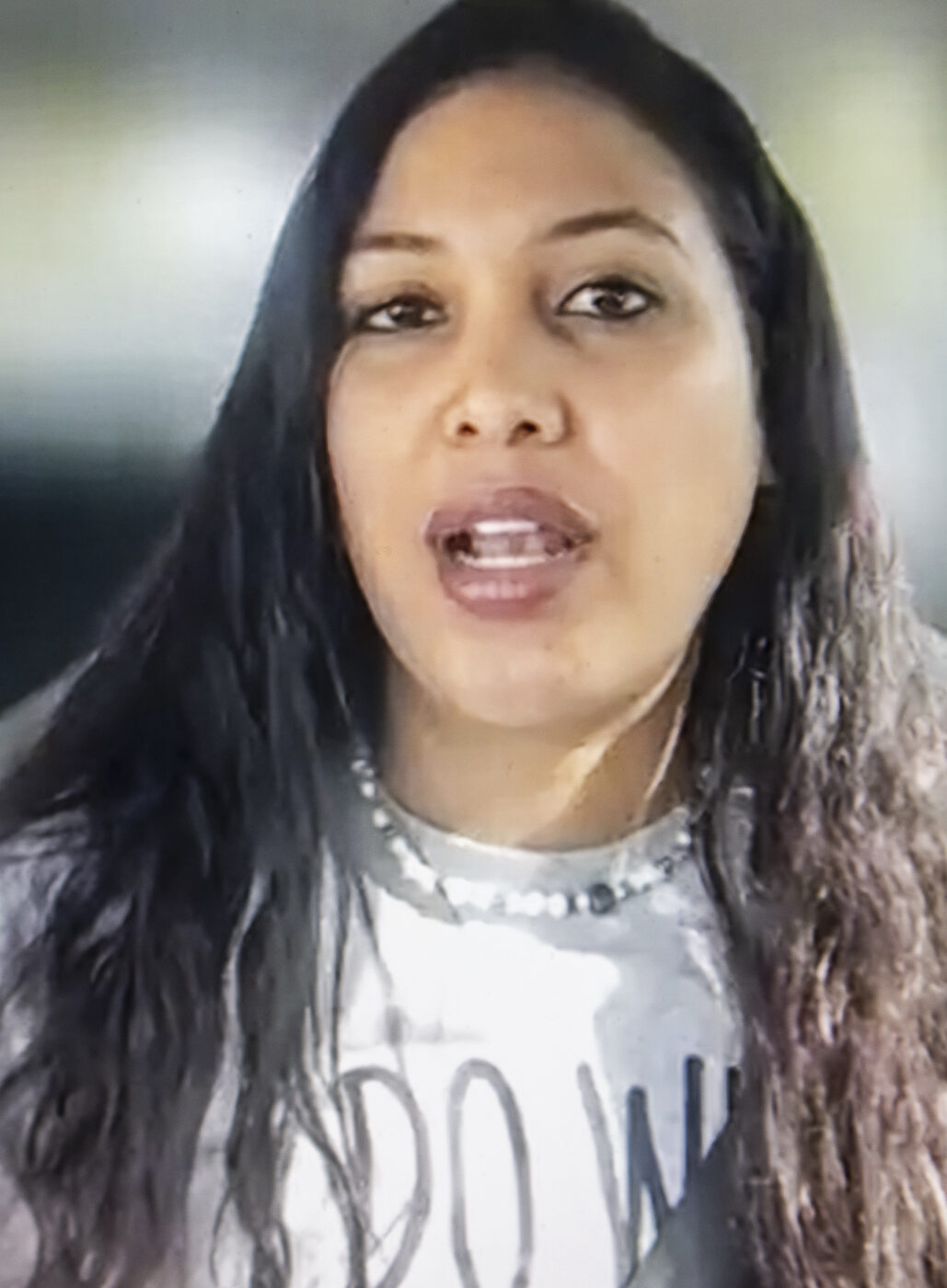 The question on the floor was, “Cuba: Victim or Villain or Both?” Baro, in the United States just four months, told the story of “a human kid with a liver disease that died waiting for a transplant. But he didn’t die because he didn’t have the donor. He died because either the medical thing wasn’t complete because medical — medical people are fleeing the country like everybody else, Or he died because there were no medical supplies for his operation. . . .
The question on the floor was, “Cuba: Victim or Villain or Both?” Baro, in the United States just four months, told the story of “a human kid with a liver disease that died waiting for a transplant. But he didn’t die because he didn’t have the donor. He died because either the medical thing wasn’t complete because medical — medical people are fleeing the country like everybody else, Or he died because there were no medical supplies for his operation. . . .
“A Kid. And he had the most difficult thing to get — that is, the donor. . . .”
Baro added, If the Cuban government is investing its money “in building hotels when all the hotels they have right now are empty, what are they doing? If they are not seeing that the people in the country need medicine, need food, and they are just thinking about building hotels, how is that the result of the U.S. embargo?” asked Baro, who is Afro-Cuban.
 “They blame all the evils on the island on the embargo,” messaged Julio A. Rojas (pictured), an Afro-Cuban journalist who planned to join the discussion from the island but found the internet in his area not to be working. “The true blockade is the one that the regime has against the Cuban population, which does not allow them to prosper or advance economically freely, they do not deceive me and many of the people have lost their blindfold.”
“They blame all the evils on the island on the embargo,” messaged Julio A. Rojas (pictured), an Afro-Cuban journalist who planned to join the discussion from the island but found the internet in his area not to be working. “The true blockade is the one that the regime has against the Cuban population, which does not allow them to prosper or advance economically freely, they do not deceive me and many of the people have lost their blindfold.”
In a one-party state where the government controls the media, such messages aren’t communicated with the bandwidth they might be elsewhere. In a statement to the Roundtable on the night before the Dec. 3 Zoom event, Rojas wrote of Cuba’s independent journalists. “We lack food, medicine and jobs in addition to journalism with which we can support ourselves,” he said. “If for the simple Cuban of civil society who supports the regime [life] is difficult, imagine the situation of independent and opposition journalists.
“In some cases the family supports them and supports them as much as they can, in other cases there is no applause because they are divided and do not support the opposition family member. It is very hard and unsustainable, [the] situation of some independent journalists, in which I include myself. In addition to that, we are followed by the political police, they threaten us with long prison sentences if we do not abandon journalism, yet we continue writing and publishing [about] the abuses and violations of the regime.”
Other journalists have it worse. When the Committee to Protect Journalists last year awarded Abraham Jiménez Enoa its International Press Freedom Award, he told of how he was forced to flee Cuba for Spain and dedicated his award to two other independent journalists now in Cuban prisons. The wife of one, Lázaro Valle Roca, fears for the state of his health. The other, Jorge Bello Domínguez, serving a 15-year sentence for participating in a demonstration, was said to have been beaten by other prisoners on orders of the authorities and at one point was eating only food his family brought him.
Forty-one people were on the Journal-isms Roundtable Zoom, with another 54 watching on Facebook and 40 later on YouTube, as of Wednesday morning. The conversation proceeded with the help of a translator. Many of the participants had been to Cuba over the years. Nearly all the Cuba natives made a sharp distinction between the Cuban government and the Cuban people. You can watch the embedded video above or here.
Since the 1960s, the United States has imposed an embargo against Cuba, a country only 90 miles off the coast of Florida. The embargo, known among Cubans as “el bloqueo” or “the blockade,” consists of economic sanctions against Cuba and restrictions on Cuban travel and commerce for all people and companies under U.S. jurisdiction.
These Cold War sanctions were originally imposed to contain the spread of communism, as Premier Fidel Castro aligned the country with the Soviet Union.
The rest of the world has consistently voted against the embargo when the issue came before the United Nations. A Nov. 2 General Assembly vote, though not legally binding and unenforceable, opposed the United States for the 31st time.
Cuban Foreign Minister Bruno Rodriguez accused the United States of trying to weaken Cuba’s economic life, leave its people hungry and desperate, and overthrow the government, Edith M. Lederer reported for the Associated Press.
Still, Reuters reported in 2014, “Since the Trade Sanctions Reform and Export Enhancement Act (TSRA) was implemented in 2000, the United States has exported nearly $5 billion worth of agricultural products to Cuba. These exports have been supported by the close geographical proximity of the United States to Cuba and the island’s strong demand for U.S. agricultural products. The United States has typically been the largest supplier to Cuba and has had the highest market share of the island’s imports in nine out of the last 11 fiscal years.”
That’s true even though the United States is only one of many countries with which Cuba does business, and as Serafin Moran, an exiled independent Afro-Cuban journalist, pointed out on the call, the blockade is porous. “There are many Cuban products, soda, beer, tobacco, that are sold here in North American stores,” he messaged.
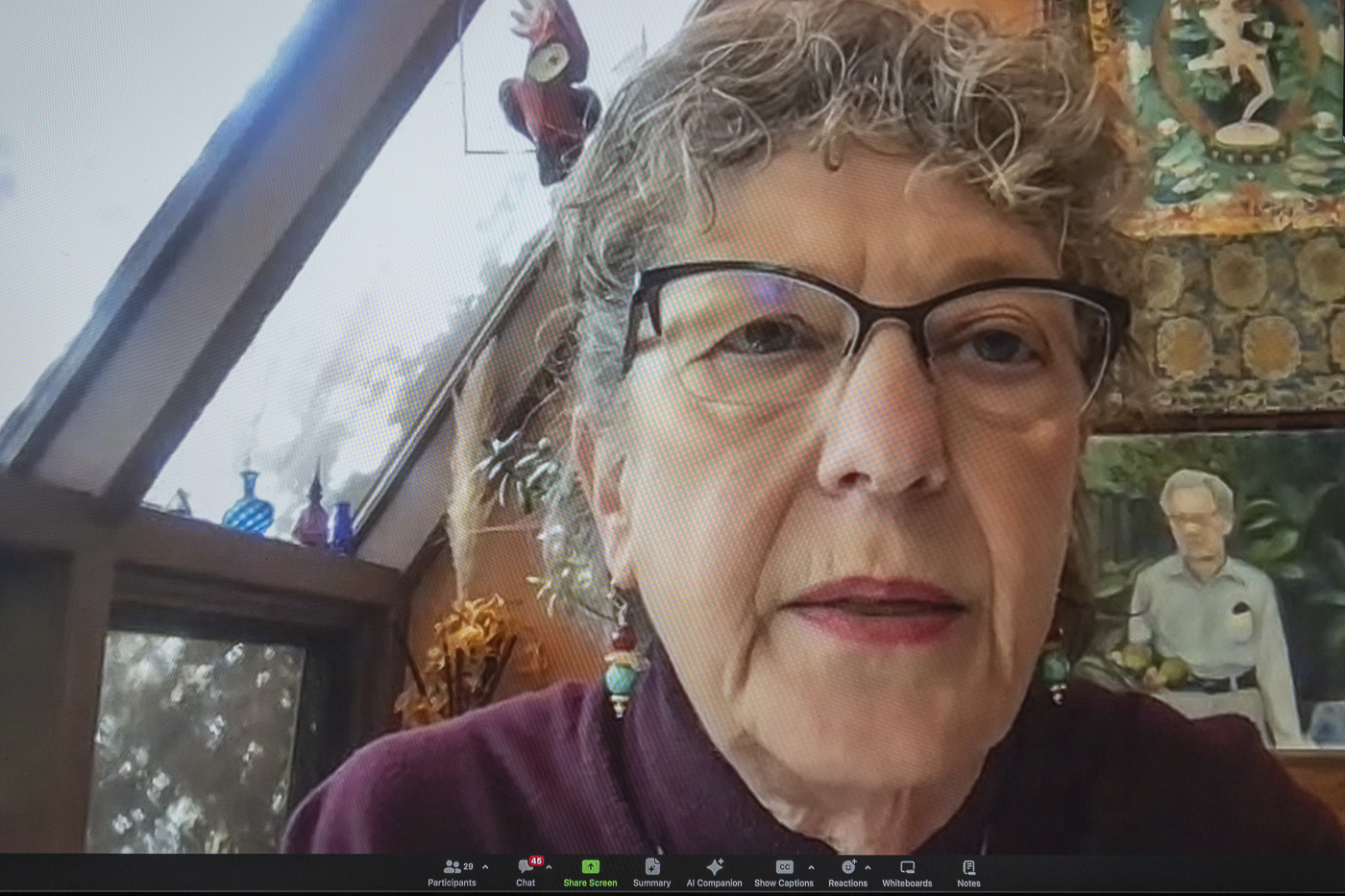 Zita Arocha (pictured), a longtime journalist in the United States and native of Cuba, acknowledged that the Cuban government finds ways around the sanctions, but also noted, “The main issue with the embargo is that it prevents Cuba from operating in the global financial markets, so that, for example, it must pay cash to purchase U.S. chickens and agricultural products. There’s even a provision that prohibits foreign businesses from selling to Cuba any product that includes a percentage of U.S. produced materials. . . . It’s complicated!”
Zita Arocha (pictured), a longtime journalist in the United States and native of Cuba, acknowledged that the Cuban government finds ways around the sanctions, but also noted, “The main issue with the embargo is that it prevents Cuba from operating in the global financial markets, so that, for example, it must pay cash to purchase U.S. chickens and agricultural products. There’s even a provision that prohibits foreign businesses from selling to Cuba any product that includes a percentage of U.S. produced materials. . . . It’s complicated!”
Rather than citing the now-defunct Soviet Union as its justification, the United States argues human rights — and that includes press freedom.
U.S. deputy ambassador Paul Folmsbee told the U.N. General Assembly after the Nov. 2 vote that the United States stands by its sanctions, which are “one set of tools in our broader effort toward Cuba to advance democracy and promote respect for human rights and fundamental freedoms.”
Folmsbee said approximately 1,000 political prisoners remain behind bars in Cuba, more than at any point in its recent history. He urged Cuba to respond to requests from the U.N. Human Rights Council to send experts to the country to investigate its adherence to rights including freedom of expression, religion and peaceful assembly, Lederer wrote for the AP.
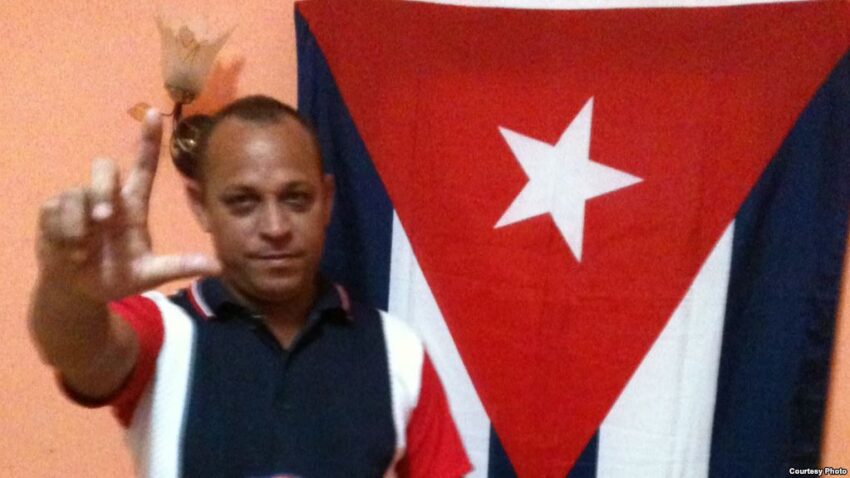
At the Roundtable, Baro pointed to a new Cuban social communications law signed in May that “stipulates that news agencies, radio, television, and print and digital media ‘are socialist property of all the people or of political, mass and social organizations, and cannot be under any other type of ownership,’ leaving out the independent press,” as LatAm Journalism Review reported.
“At the same time, it gives the power to restrict content that is used ‘to make propaganda in favor of the war of a foreign state hostile to the interests of the nation’ or that is used to ‘defame, slander or insult people, organs and agencies of the State,’ ” the Review continued.
Baro told the Roundtable, “You can go to prison for sedition or treason, but it’s not well-defined what qualifies as sedition or treason. So maybe if you’re speaking bad of the government in your social media you can go to prison.”
 To Dagmar Thiel (pictured), who heads the Latin American press-freedom group Fundamedios, Cuba’s authoritarianism is part of a trend in Latin America. “We are having the Nicaraguan government just doing the same practices of suppressing the opinion of their citizens or detaining people. You may know most of you this year the beauty queen, the Miss Universe, was in Nicaragua. She was banned from going back home because she was wearing her white dress and the blue scarf,” the colors of the Nicaraguan flag, and photos emerged of the winner, Sheynnis Palacios, taking part in mass anti-government protests in 2018, which were eventually crushed by security forces.
To Dagmar Thiel (pictured), who heads the Latin American press-freedom group Fundamedios, Cuba’s authoritarianism is part of a trend in Latin America. “We are having the Nicaraguan government just doing the same practices of suppressing the opinion of their citizens or detaining people. You may know most of you this year the beauty queen, the Miss Universe, was in Nicaragua. She was banned from going back home because she was wearing her white dress and the blue scarf,” the colors of the Nicaraguan flag, and photos emerged of the winner, Sheynnis Palacios, taking part in mass anti-government protests in 2018, which were eventually crushed by security forces.
Thiel also named Guatemala, Brazil and Venezuela.
To the question at hand, “I think that places Cuba on the side of the villain because with the economic blockage you can be a victim, but choosing to violate daily the human rights of your citizens is to be a villain,'” she said.
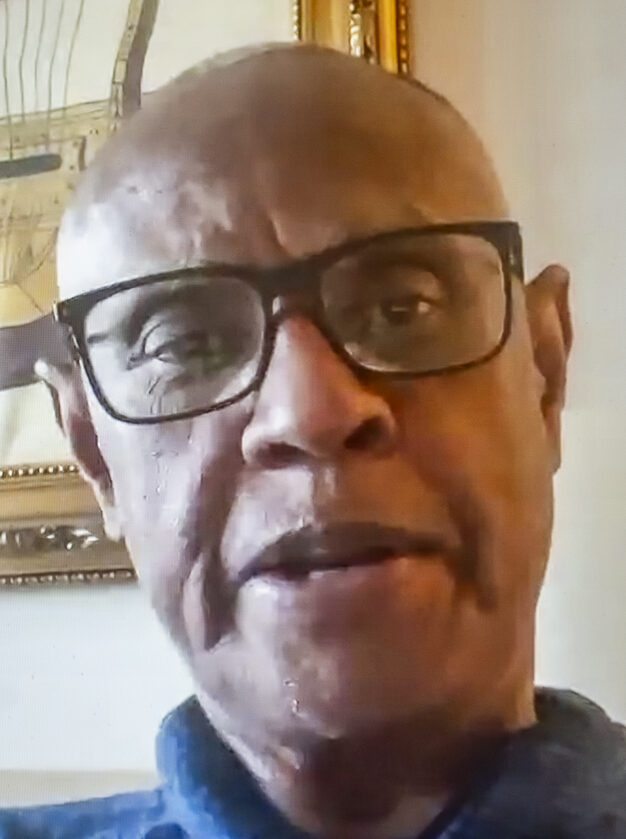 To be sure, the Cuban government had its defenders. Melvin Foote (pictured), the founder of the Constituency for Africa whose suggestion inspired the Roundtable, went on a trip to Cuba over the summer. He said of the government, “Now, are they perfect?
To be sure, the Cuban government had its defenders. Melvin Foote (pictured), the founder of the Constituency for Africa whose suggestion inspired the Roundtable, went on a trip to Cuba over the summer. He said of the government, “Now, are they perfect?
“I’m sure they’re not, but you got to also understand what the pressure of the U.S. government — I wouldn’t be surprised if those are some, you know, tendencies of the government to overreach. I would not be surprised whatsoever. I think some of the comments about press freedom are probably true, I don’t doubt that, but I think it also has to be on balance here. I came back feeling like the U.S. government is still fighting Fidel Castro, you know, Fidel Castro is long gone, you know, we still, you know, ‘we got to do something about these Cubans.’ [“Fidel Castro might be long gone, but his ideas are very much present in the Cuban government,” Baro later responded.]
“And, I did appreciate the fact that I didn’t see hunger in the streets, you know, I didn’t see people who couldn’t go see a doctor.
“I think about the treatment of humanity. They’re a hell of a lot better in Cuba than we are here, you know?”
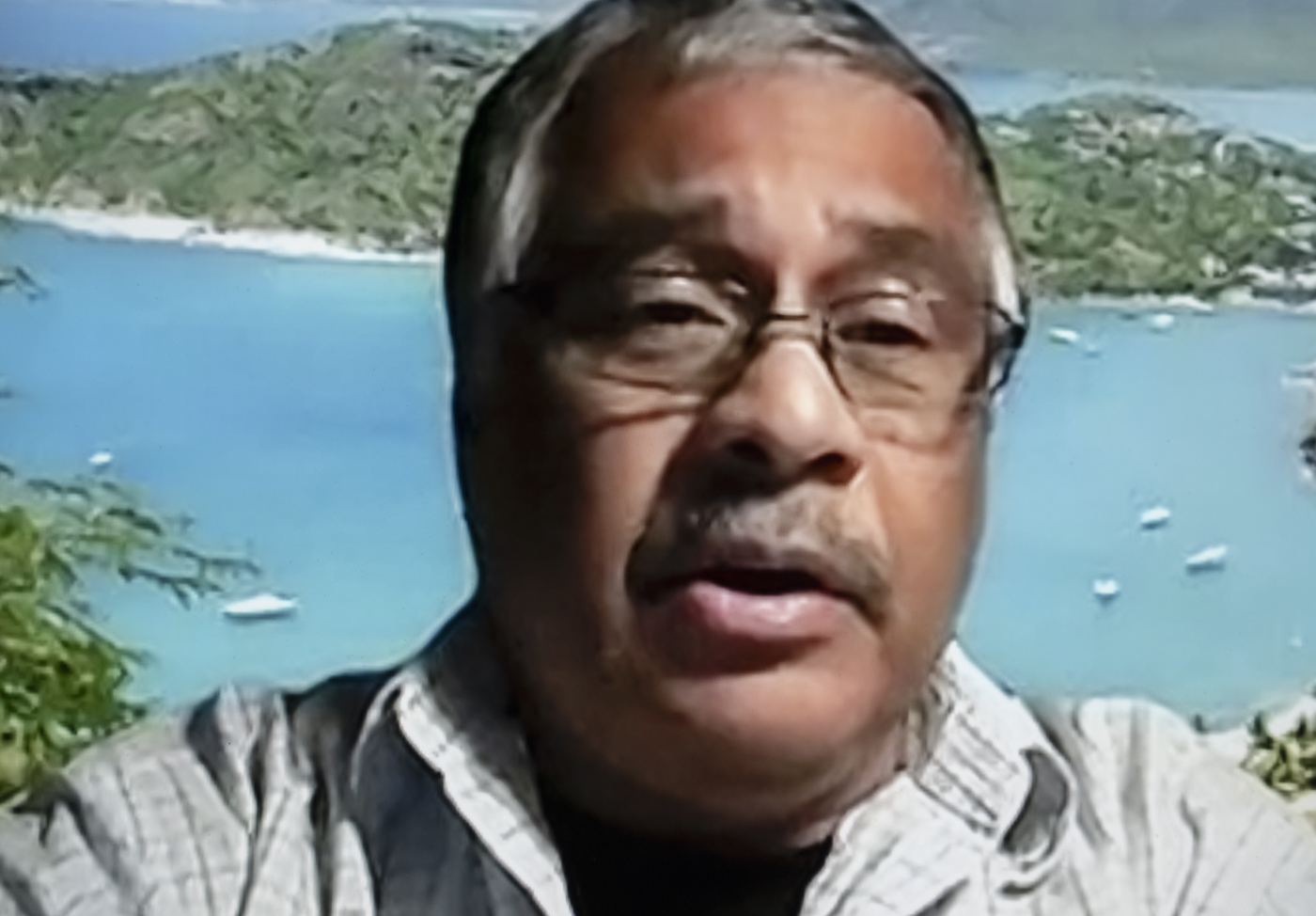 Wesley Gibbings (pictured), a Trinidadian journalist who is a past recipient of the National Association of Black Journalists’ Percy Qoboza award to a foreign journalist, noted that CARICOM, the organization of Caribbean countries originally called the Caribbean Community and Common Market, has a “strong sense of fraternity” with Cuba, though experiments in Jamaica and Grenada adopting a Cuban model failed.
Wesley Gibbings (pictured), a Trinidadian journalist who is a past recipient of the National Association of Black Journalists’ Percy Qoboza award to a foreign journalist, noted that CARICOM, the organization of Caribbean countries originally called the Caribbean Community and Common Market, has a “strong sense of fraternity” with Cuba, though experiments in Jamaica and Grenada adopting a Cuban model failed.
Gibbings said, “We have in the Caribbean . . . the kind of pie that dissects these issues far more acutely than other countries that see themselves as having a paternalistic relationship with the rest of the world. . . .” He also said, “I’m always very hesitant about adopting a position of good guy, bad guy,” and that “We are acutely aware of the problems of race in Cuba, because as Black countries, we share a strong sense of solidarity. And we are fully aware that Cuba has never ever, from day one preceding the revolution and now, come to terms with the fact of its diversity.”
Others spoke of issues of colorism and racial stereotyping by Cubans who come to the United States, but Felix Contreras, who hosts a Latin music show on NPR, said that few other countries are as open about acknowledging their African roots.
In July, the Cuban government issued a news release about a meeting with DeWayne Wickham, founding dean of Morgan State University’s School of Global Journalism & Communication and columnist. The release said Vice President Salvador Valdés Mesa “praised the variety of social, civil and racial issues that Mr. Wickham addresses and actively acts upon on a permanent basis and thanked him for his work in favor of Cuba-U.S. relations and against the blockade.” Valdés bestowed on him “the status of Guest Professor by the University of Havana.“ The release made no mention of any discussion of press freedom issues. Wickham has been taking colleagues, students and faculty members to Cuba for two decades.
Unmistakably, part of the defense of Cuba’s regime is the United States history with the island.
“A lot of what Cuba has acted and responded to the U.S. is because they have been under constant aggression,” Arocha said. “The embargo is just one example. Do you all remember the assassination attempts? How many there were against Fidel? Do you remember a Bay of Pigs? Right? Do you remember all that stuff?
“Okay, so a lot of the way in which the government has responded, never mind Fidel’s ideas, but it has been in reaction to aggressions by the United States. So I think we have to put all this in context. As far as where they’re
going, I have no idea. I don’t think that that system can be sustained the way that it is. They they have all kinds of tricks to get around the embargo. You know, like, Rocio was saying, but you know, Lord knows, lord knows. And so we have to keep the story in context. There’s a wonderful book that won a Pulitzer Prize by Ada Ferrer [“Cuba: An American History“] . . .
“And basically, she takes us all the way back. . . . let’s remember the complexity of this situation, let’s remember how
the U.S. has, in many cases, created the background for some of the responses that Cuba has taken.
And they feel that they’re a country under attack, for good reason.”
The attendees reminded one another that the conversation was not just about policy, but about the toll those policies have on journalists and citizens alike. And they wondered aloud how U.S. journalists could help the independent journalists.
Baro told the group, “We are in pain because even us that . . . are not in Cuba anymore, we live in a sort of limbo where we don’t know if we are going to be able to go back at any time. We don’t know when we are going to see our families again.
“So we live in a limbo. We don’t belong to the places we live right now, but the place that we left that was called home doesn’t exist anymore. So when you live in that reality, in that situation, your whole life is very difficult and it’s very difficult to explain to other people.”
As a professor for five years at Havana University, Baro said, a lot of her journalism students “were persecuted as well . . . They were called to their houses and they was like, you have only 3 choices. You can stop making journalism, you can leave the country or you can go to prison. . . .
“You have to say that everything that you say was paid by the U.S. government. And we know that as journalists the only thing that we have — I’m not a journalist but all my friends are . . . . the only thing that you have is your credibility. So if you go on national television, and here in Cuba all the media are controlled by the state. . . . you don’t have any other space to reply. That’s the only space you have.
“So it’s very difficult to make a comeback as a journalist when you go on national television [and] you say everything [I said] was paid by the US government.”
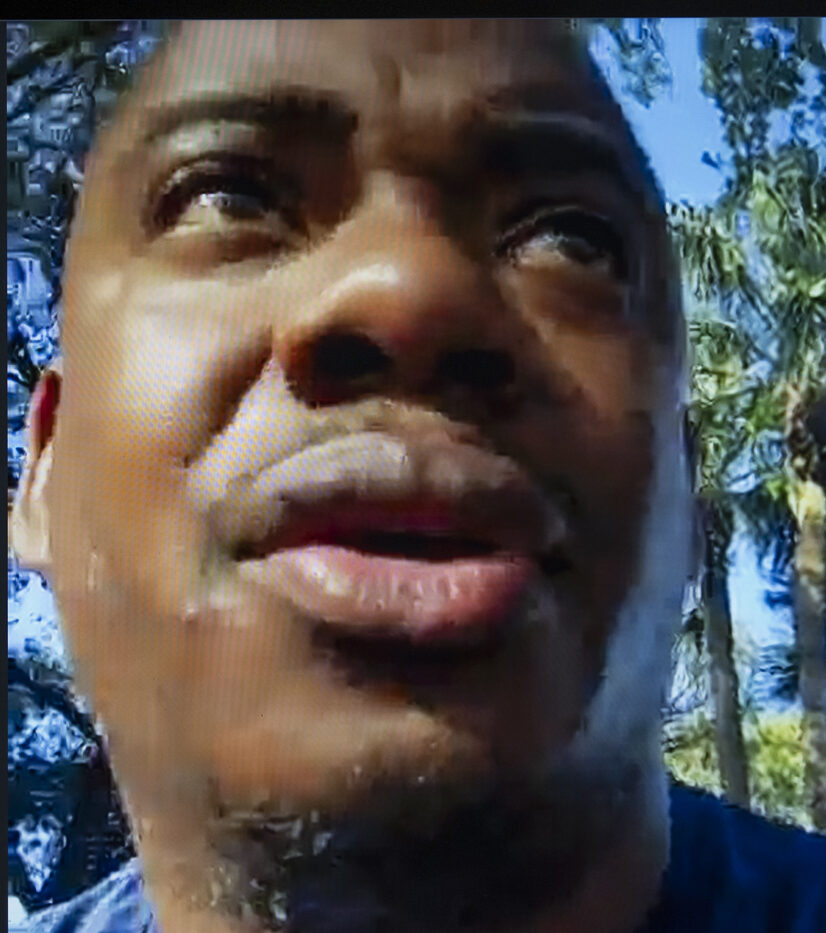 Moran (pictured), who won exile in the United States in 2018 with help from press freedom groups, said through a translator that today he is “separated from my two daughters, and also from the rest of my family. I have received threats, persecution, I have been shot at with [people] armed with weapons, I have received beatings. And I am because I talked about the Cuban regime. I know others that also have gone through the same situation.”
Moran (pictured), who won exile in the United States in 2018 with help from press freedom groups, said through a translator that today he is “separated from my two daughters, and also from the rest of my family. I have received threats, persecution, I have been shot at with [people] armed with weapons, I have received beatings. And I am because I talked about the Cuban regime. I know others that also have gone through the same situation.”
Of Rojas, his fellow independent journalist, and others still on the island, Moran said, “to feed themselves, they have to go into hiding and see how they can go and find those news, those things that nobody knows about. And then they give it to the media and get some money to live. Because if you are not with the government, you receive no salary and you only receive a threat to be imprisoned.”
More are leaving. Reuters reported last month, “About 10,700 Cubans were encountered at the U.S.-Mexico border in September, up from around 6,200 a month earlier, according to U.S. government statistics. Levels of border arrivals, however, are still lower than a year ago, when fewer legal avenues existed to apply from abroad.”
The Roundtable ended with suggestions that the group organize a trip to Cuba themselves to see the situation first-hand.
In his Dec. 2 statement written from Cuba to the Roundtable, Rojas addressed that possibility.
“There is an Arabic proverb that says; that the snake before the bite enchants the victim. The regime of Havana exercises a diabolical enchantment over those people who visit the island with the objective of observing and ensuring compliance with human rights,” he wrote.
“Such people, upon leaving Cuba, become defenders of the ‘wonderful things that exist on the island’, become accomplices and spokespersons for the regime. They have sweetened the pill with lies, guided them to see what they want them to see in staged scenarios while the truth is hidden behind the scenes. They deceived them, if indeed they are deceived.
“These defenders do not visit the relatives of political prisoners, they do not visit the jails where the political prisoners are repressed, where officials are violating their rights to phone calls, to decent food, health care and family visits.
“This is the true reality of human rights in Cuba. American journalists visiting the island should interact with real civil society and not what the regime shows them. This way they will see the reality of the regime.”
Baro told the group, “If you want to [go], yes, but I always say to people, don’t go to hotels.
“If you want to go to Cuba, go and rent a Airbnb because that money will be helping a Cuban and that money won’t go to to the government.
“Because if you go to a hotel and if you go to a place state-ruled you will be helping the dictatorship in Cuba. So yeah, but if you are going, [patronize] a private business, then you will be helping a Cuban person.”
The Cuban government, which has watched the video of the Roundtable, has been asked to comment on some of the accusations levied against it.
- 14ymedio: Cuba’s Kangaroo Courts Strike Again — Finds Professor Alina Barbara Lopez Guilty of ‘Disobedience’ (Nov. 30)
- Francisco Acevedo, Havana Times: A Congress of Journalists in Cuba? (Nov. 13)
- Barbara Gutierrez, University of Miami: How free is a journalist’s reporting in Cuba? (April 10)
- Journal-isms: Cuban Agents Said to Stalk Exiled Journalist (Oct. 18) (second item)
- Journal-isms: A Day for Journalists Who Fled for Their Lives: Cubans, Ethiopians, Southeast Asians Are Just a Few (Nov. 5)
- Journal-isms: Press Group Scores Nicaragua, Cuba, Venezuela (Nov. 18) (scroll down)
- Journal-isms: U.S. Media Downplay Threats to Latin Colleagues (June 11, 2022)
- Edith M. Lederer, Associated Press: UN votes overwhelmingly to condemn US economic embargo on Cuba for 31st year and urge its lifting (Nov. 2)
- Daniel Marans, Huffington Post: Cuban-American Journalists Warn Against Romanticizing Fidel Castro (Nov 26, 2016)
- Sarah Moreno, Miami Herald: Juanita Castro, sister of Fidel and longtime opponent of communism, dies in Miami
- Organization of American States: Annual Report of the Inter-American Commission on Human Rights — Cuba, 2022 (PDF)
- Rosa María Payá and David E. Hoffman, George W. Bush Presidential Center: Championing Freedom in Cuba (Oct. 31, 2022)
- Tiffany Pham, Forbes: How She Did It: Yoani Sánchez Launches Cuba (Nov. 30, 2014)
- Eugene Robinson, Washington Post: A win for Cuba’s people (Dec. 18, 2014)
- Eugene Robinson, Washington Post: Cuba Begins to Answer Its Race Question (Nov. 12, 2000)
- Dan Vera, American Prospect: New Day: The Intricate Dance of Being a Cuban American (Dec. 22, 2014)
- Radio Marti: Mother of 11J prisoner denounces beating of her son in prison (July 5, 2022)
- Julio A. Rojas, Journal-isms: An Independent Afro-Cuban Journalist’s Statement to the Journal-isms Roundtable
To subscribe at no cost, please send an email to journal-isms+subscribe@groups.io and say who you are.
Facebook users: “Like” “Richard Prince’s Journal-isms” on Facebook.
Follow Richard Prince on Twitter @princeeditor
Richard Prince’s Journal-isms originates from Washington. It began in print before most of us knew what the internet was, and it would like to be referred to as a “column.” Any views expressed in the column are those of the person or organization quoted and not those of any other entity. Send tips, comments and concerns to Richard Prince at journal-isms+owner@
View previous columns (after Feb. 13, 2016).
View previous columns (before Feb. 13, 2016)
- Diversity’s Greatest Hits, 2018 (Jan. 4, 2019)
- Book Notes: Is Taking a Knee Really All That? (Dec. 20, 2018)
- Book Notes: Challenging ’45’ and Proudly Telling the Story (Dec. 18, 2018)
- Book Notes: Get Down With the Legends! (Dec. 11, 2018)
- Journalist Richard Prince w/Joe Madison (Sirius XM, April 18, 2018) (podcast)
- Richard Prince (journalist) (Wikipedia entry)
- February 2018 Podcast: Richard “Dick” Prince on the need for newsroom diversity (Gabriel Greschler, Student Press Law Center, Feb. 26, 2018)
- Diversity’s Greatest Hits, 2017 — Where Will They Take Us in the Year Ahead?
- Book Notes: Best Sellers, Uncovered Treasures, Overlooked History (Dec. 19, 2017)
- An advocate for diversity in the media is still pressing for representation, (Courtland Milloy, Washington Post, Nov. 28, 2017)
- Morgan Global Journalism Review: Journal-isms Journeys On (Aug. 31, 2017)
- Diversity’s Greatest Hits, 2016
- Book Notes: 16 Writers Dish About ‘Chelle,’ the First Lady
- Book Notes: From Coretta to Barack, and in Search of the Godfather
- Journal-isms’ Richard Prince Wants Your Ideas (FishbowlDC, Feb. 26, 2016)
- “JOURNAL-ISMS” IS LATEST TO BEAR BRUNT OF INDUSTRY’S ECONOMIC WOES (Feb. 19, 2016)
- Richard Prince with Charlayne Hunter-Gault, “PBS NewsHour,” “What stagnant diversity means for America’s newsrooms” (Dec. 15, 2015)
- Book Notes: Journalists Follow Their Passions
- Book Notes: Journalists Who Rocked Their World
- Book Notes: Hands Up! Read This!
- Book Notes: New Cosby Bio Looks Like a Best-Seller
- Journo-diversity advocate turns attention to Ezra Klein project (Erik Wemple, Washington Post, March 5, 2014)

